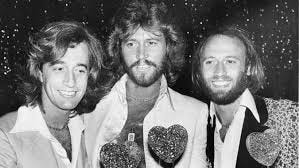As music documentaries go, Frank Marshall’s sweeping narrative about the adventures of the Bee Gees in the music business hews to conventional form. The Bee Gees: How Can You Mend a Broken Heart charts the group’s rise-and-fall-and-rise story through carefully edited home movies and archival footage. It lingers over the group’s distinctive songs and harmony singing, and enhances appreciation of them with musical insights and admiration from musicians and songwriters influenced by the Brothers Gibb, among them Noel Gallagher of Oasis.
And then, somewhere after the halfway point, the film makes a sly pivot. Viewers see the Bee Gees working on the disco hits from Saturday Night Fever, then taking the stage at stadium gigs, punctuated by breathless discussion about the group’s dominance of the pop charts. We see them tasting success, followed very suddenly by news coverage of the “Disco Sucks” movement. One minute the Bee Gees are everywhere, the next they are in the crosshairs of a widespread pop-culture rejection led by rock radio DJs like Chicago’s influential Steve Dahl. There’s extensive footage of Dahl’s “Disco Demolition Night” in which disco records were exploded between games at a major league baseball doubleheader, along with a recollection from house music pioneer Vince Lawrence (who was working at the ballpark as an usher that day) that the destruction went beyond disco – to include Stevie Wonder classics and R&B records in what he laments as a “racist and homophobic book burning.”
With that scene, Marshall brings viewers inside the nature of backlash. Its suddenness and severity. Its immediate effects and its less-explored long-term impacts. In short, rapid scenes, the essence of the Gibbs Brothers’ contribution to music is overtaken by shouting and anger, as an affronted mob expresses its aesthetic indignation. The editing makes it jarring – an intentional choice that just might parallel the way Barry, Robin and Maurice Gibb experienced it, or the way Phil Collins, another backlash target, did later. In just a few minutes of screen time, the film shows how an inflammatory reaction can spread and take root, how raw intolerance can steamroll over decades of diligent, incredibly accomplished, reputation-making work.
I was a high school band geek and jazz snob in training during the time this was going on. I might not have had the Disco Sucks T-shirt but I was a sympathizer, for a while. The film does not judge those like me who got swept up – its mission is elsewhere – but it nudges us, in a masterful and subtle way, to consider our knee-jerk reactions and default biases. It accomplishes this through music, specifically the earnest, enduring and enviably sticky songs of the Bee Gees (and those the Gibbs wrote for Barbra Streisand and many others). Even the sappy ‘80s-ballad hits that pop up in the closing moments of the soundtrack left me with one thought I still can’t shake: How about all this supremely well-crafted music I missed while being a hater?
Further Inquiry: This Undone podcast explores Disco Demotion Night in detail.
Yes, we have a fancy digital suggestion box. Share here: echolocator@gmail.com
Please consider subscribing (it’s free!). And…..please spread the word! (This only works via word of mouth!)
Subscribe here.
Thanks!





